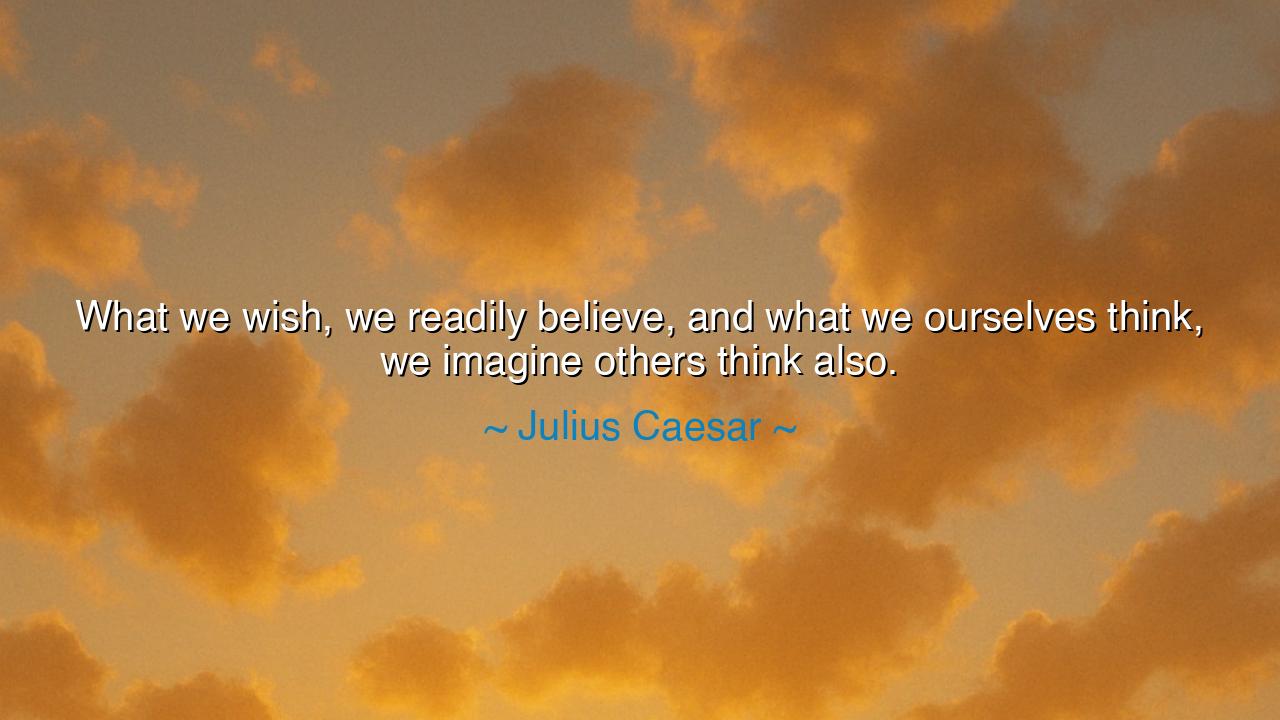
What we wish, we readily believe, and what we ourselves think, we
What we wish, we readily believe, and what we ourselves think, we imagine others think also.






“What we wish, we readily believe, and what we ourselves think, we imagine others think also.” So spoke Julius Caesar, conqueror of nations and master of men’s hearts — a ruler who understood that the greatest empire lies not only upon the earth, but within the human mind. In these few immortal words, Caesar revealed one of the deepest truths of human nature: that our desires shape our beliefs, and our beliefs shape the world we see. What the heart longs for, the mind declares to be true; and what the mind assumes, it projects upon others as if the whole world shared its vision.
The origin of this quote lies in the crucible of power and politics, where Caesar, a man of cunning intellect, learned that human perception is not ruled by logic, but by desire. He saw that men are not moved by what is, but by what they wish were so. When ambition blinds the eye, fantasy becomes fact, and hope becomes evidence. Caesar, who rose from an exiled noble to a god among mortals, understood how belief could conquer armies long before the sword was drawn. His words were not of pride, but of warning — that self-deception is the most subtle form of defeat.
We must understand, as Caesar did, that the mind hungers for affirmation, not truth. When we long for victory, we begin to see it everywhere; when we fear betrayal, we find it in every shadow. Thus, the heart deceives itself, and the mind becomes its willing accomplice. This is why empires crumble from within — not by the strength of their enemies, but by the illusions of their own making. For what we wish, we quickly believe; and belief, when unchecked by reason, becomes the architect of our downfall.
Consider the story of King Lear, from the great poet Shakespeare, centuries after Caesar’s time. Lear, desiring love above all, believed the flattering words of his false daughters and banished the one who truly cared for him. His wish for devotion made him believe in lies, and his belief led to ruin. In his tragedy, we see the echo of Caesar’s wisdom: that when desire governs perception, truth is exiled from the heart. How many of us, like Lear, trust the sweetened voice because it tells us what we want to hear, not what we need to know?
And yet, Caesar’s words carry not only warning but revelation. For they teach that self-awareness is the shield against illusion. If we recognize that our wishes color our beliefs, we gain mastery over our thoughts. To rule the mind is greater than to rule nations. The true conqueror, Caesar might say, is not he who subdues others, but he who subdues himself — who dares to question his own certainty, and who looks upon his desires not as truth, but as temptations of the heart.
As for the second part of the quote — “what we ourselves think, we imagine others think also” — it unveils the mirror of the soul. We believe others share our motives, our fears, our judgments. The honest man assumes honesty in all; the deceiver suspects deceit in everyone. Caesar, who walked among allies and assassins alike, knew well that this projection blinds the wise and exposes the innocent. To think that all men see as we do is the first illusion of pride — and pride, as Caesar himself learned on the Ides of March, is the herald of downfall.
The lesson, then, is as timeless as the Tiber’s flow: guard the gates of your mind. Examine your wishes, question your beliefs, and seek truth even when it wounds you. Do not mistake desire for destiny, nor assume that your thoughts are the measure of others’ hearts. The wise walk in humility, knowing that men see the world not as it is, but as they are. Seek counsel, temper passion with patience, and let reality, not longing, be your guide.
For when you learn to see beyond the veil of wish and belief, you become free — a ruler not of men, but of yourself. And in that freedom, as Caesar knew too late, lies the truest and most enduring victory: the mastery of one’s own heart.






AAdministratorAdministrator
Welcome, honored guests. Please leave a comment, we will respond soon